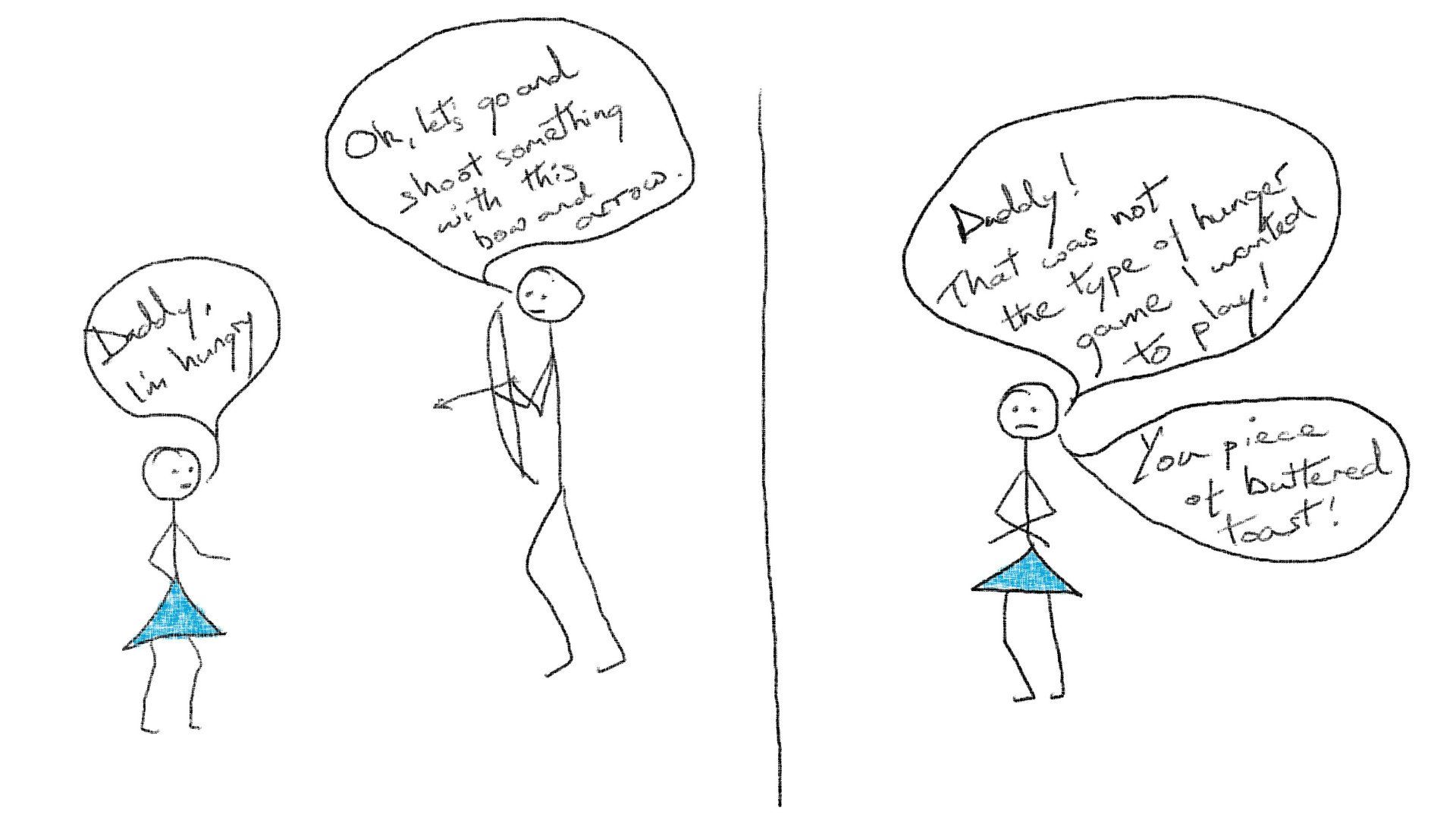
Are You...
Making Mealtimes A Battleground?
Make sure they're hungry at mealtimes
Avoiding Hunger Games

Xyz
Young children have higher energy needs and smaller stomachs than adults, but...
That doesn't mean they need to eat on demand.
Just as with sleeping there is always likely to be two schools of thought. Some parents will allow their children to fall asleep when they're tired, others will stick to a routine of nap and sleep times. Equally, some parents will allow their children to eat when they indicate they are hungry and others will stick to a routine of snack and mealtimes.
The danger with on demand eating is that it can be easily manipulated and, as all parents know, young children are expert manipulators.
Young children can use hunger pleas for a whole raft of reasons. From gaining attention, to avoiding or delaying something they don't want to do, to relieving boredom, to getting 'treats', to avoiding being hungry at mealtimes and more besides. I will cover the non food related aspects elsewhere, but for now let's stick to the subject of food.
Avoiding our children's 'hunger games' is simply a question of maintaining blood sugar levels...
The first step to avoiding on demand eating is to make sure our children aren't so hungry between snacks/meals that it effects their concentration, focus or behaviour.
If we can keep their blood sugar levels at a reasonable level they are less likely to ask for food and we're less likely to give it to them This is to say nothing of all the health, behavioural and educational benefits of well maintained blood sugar levels.
Maintaining blood sugar levels does depend to some extent on age.
A very young child has a smaller stomach and relatively higher energy needs, whereas by the time they're 5 they can go between most meals without a snack unless mealtimes are too far apart.
That means very young children need more accessible sources of energy more frequently than older children who have the stomach capacity and ability to digest more complex carbohydrates and sources of protein.
I'm sure you don't need me to tell you that blood sugar management is largely a question of avoiding excessive sugar and highly processed grains - which get rapidly turned in to sugar, sometimes even before they reach the stomach!
Kids breakfast cereals, cakes/biscuits/pastries sweets and sugary drinks (even smoothies) are the things to avoid. These can be easily be replaced with low sugar cereals, wholemeal crackers / bread and milk.
Milk is particularly important. It provides the basis of growth (protein and calcium) as well as other nutrients and energy and is a great hydrator. I think it's true to say that well over 90% of what my 6 year old has drunk in her life is milk. A year or two ago that would have been virtually 100%, but now she drinks water at school.
Another thing I use as much as possible because of its health benefits and ability to help stabilise blood sugar levels, is raw olive oil. I add it at the last minute to many of my daughters meals and she loves to have a big puddle of it on a plate to dip her bread into.
And having the confidence to 'no'...
Of course, maintaining blood sugar levels doesn't automatically mean that children won't ask for food between meals.
I have one simple rule. NEVER give food on demand.
It's that simple.
The advantage I have is that my daughter virtually never asks for food so having to so no is a very rare occurrence indeed.
Where I have felt most under pressure to say yes is where other parents are freely giving out snacks or treats and I am not. For example at the park after school. Other parents feel sorry for my daughter because she doesn't have anything, so obviously they offer her some of whatever their child is eating, they always have a plentiful supply!
I am met with a look of disbelief when I say we don't do snacks after school... how can it be that a child can possibly come out of school and not be ravenously hungry? Could the answer be that they only finished their lunch less than 3 hours ago?
Abc
Xyz
Abc
Xyz
Abc
Xyz
Remember, young children do not refuse to eat things just to wind us up!
Unless we teach them to do so.
Created 21/06/2019
Last Updated 24/06/2019

